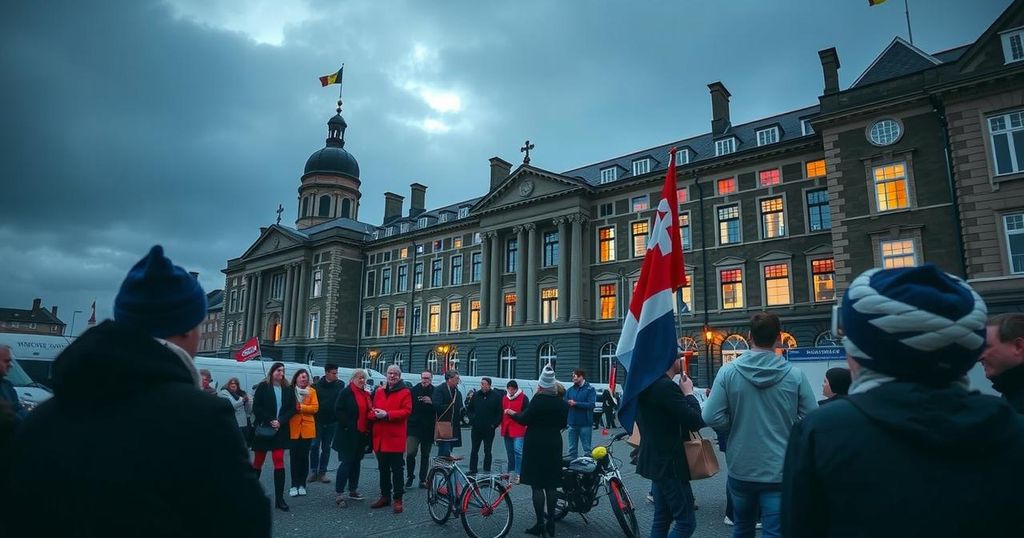Politics
AFRICA, ALTHINGI, BEN, BENEDIKTSSON, BJARNI BENEDIKTSSON, BRITAIN, EUROPE, EUROPEAN UNION, GOVERNMENT, HALLA TOMASDOTTIR, ICELAND, INDEPENDENCE PARTY, LEFT - GREEN MOVEMENT, NAMIBIA, NATIONAL ASSEMBLY, NORTH ATLANTIC, PARLIAMENTARY SEATS, POLITICS, POPULISM, PROGRESSIVE PARTY, STAR, UK
Isaac Bennett
0 Comments
Iceland Faces Parliamentary Elections Amidst Coalition Collapse and Economic Struggles
Iceland is holding parliamentary elections due to the collapse of Prime Minister Bjarni Benediktsson’s coalition government, stemming from disagreements over the economy and immigration. The country faces high inflation and an influx of asylum seekers, leading to political instability. This marks the sixth election since the 2008 financial crisis, with ten parties competing for parliamentary seats in a challenging environment exacerbated by severe weather conditions.
Iceland is conducting parliamentary elections following the collapse of Prime Minister Bjarni Benediktsson’s coalition government. The dissolution has arisen from disputes regarding economic issues, immigration policy, and the aftermath of recent volcanic eruptions that have placed additional strain on the nation. This election marks a significant moment in Iceland’s political landscape, being the sixth following the financial crisis of 2008, which has contributed to ongoing instability.
The election takes place against a backdrop of heightened public concern over inflation, which reached 10.2% in February 2023 but has slowed to 5.1% by October. Iceland’s economic challenges have been compounded by the influx of refugees, creating tension within the traditionally homogenous population. Ahead of the elections, Benediktsson, having assumed the premiership in April, faced difficulties managing a coalition comprised of the Independence Party, the Progressive Party, and the Left-Green Movement.
Voter turnout is expected to be high, as is customary in Iceland’s democratic practices, despite severe weather conditions in the sub-Arctic region which could impede access to polling stations. Ten political parties are competing for 63 parliamentary seats within the Althingi, utilizing a proportional representation system with a threshold requirement of 5% of the vote to secure a place in parliament. The previous parliamentary session included eight parties, illustrating an increasing fragmentation in Icelandic politics since the last financial crisis.
Worsening inflation rates and inadequate handling of housing shortages, particularly following natural disasters, are key issues that candidates must address to resonate with voters. As citizens cast their ballots, they will be grappling with an economy affected by both global events and domestic challenges, seeking solutions that will lead to stability and growth after a prolonged period of political turmoil.
The political landscape in Iceland has been markedly influenced by the events of the 2008 financial crisis, which decimated the nation’s economy and forced a reevaluation of traditional political allegiances. Subsequent years have seen the rise of new political parties that reflect environmental concerns, direct democracy, and increasing public dissatisfaction with established parties. This shift has resulted in a fragmented parliament and frequent elections, punctuating a cycle of instability that has persisted in the years following the crisis. Moreover, economic pressures have intensified with inflation, rising living costs, and increased immigration, all contributing to a climate of uncertainty leading up to the current elections.
The Icelandic parliamentary elections represent a crucial turning point for a nation at a crossroads, wrestling with economic adversity and political fragmentation. As candidates vie for voter support amidst climate challenges and immigration debates, the outcomes will likely impact the future governance and stability of Iceland. Understanding the recent history of political instability and public dissatisfaction will be essential for interpreting the results of this election and the direction the country will take in the coming years.
Original Source: www.aljazeera.com




Post Comment